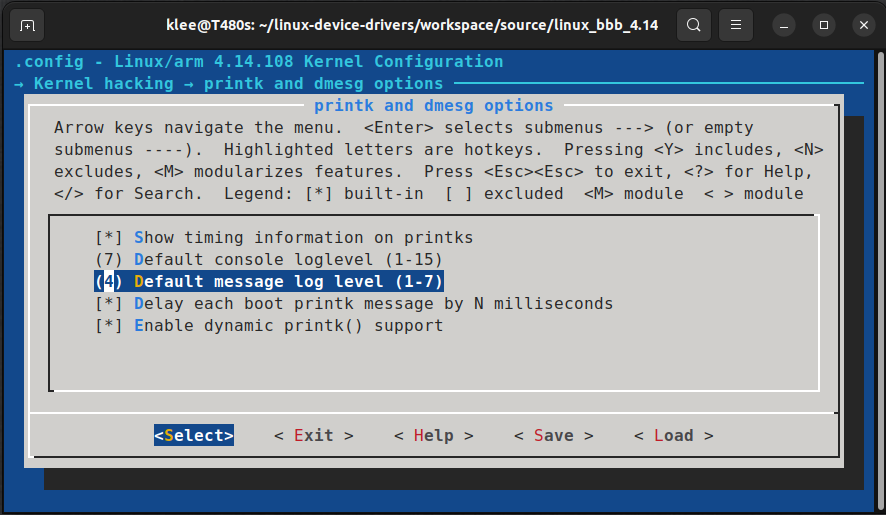Home | Projects | Notes > Linux Device Drivers > Debugging with printk & Kernel Log Levels
Debugging with printk & Kernel Log Levels
Debugging with printk
printis one of the best debugging tools we have in user-level applications.When you work in kernel space, you will not have any access to the C standard library functions like
printforscanf.As their counterpart, the kernel has its own
printf-like API calledprintk, where the letterksignifies "Kernel space printing".Examples;
xxxxxxxxxx41printf("User space.\n");2printk("Kernel space.\n"); /* Kernel space */3printf("data1 = %d, data2 = %d\n, d1, d2");4printk("data1 = %d, data2 = %d\n, d1, d2"); /* Kernel space */When using
printk, the message will go into the kernel ring buffer (a.k.a. Kernel log) and we can print and control the kernel ring buffer using the commanddmesg.To check the latest 5 kernel messages:
xxxxxxxxxx11dmesg | tail -5To check the first 20 kernel messages:
xxxxxxxxxx11dmesg | head -20printkformat specifiersxxxxxxxxxx141Variable Type printk Format Specifier2================== =======================3int %d or %x4unsigned int %u or %x5long %ld or %lx6unsigned long %lu or %lx7long long %lld or %llx8unsigned long long %llu or %llx9size_t %zu or %zx10ssize_t %zd or %zx11s32 %d or %x12u32 %u or %x13s64 %lld or %llx14u64 %llu or %llxprintkdoes not support floating-point formats (%e,%f,%g).[!] Reference: https://www.kernel.org/doc/Documentation/printk-formats.txt
Kernel Log Levels
Based on the kernel log level you can control the priority of the
printkmessages.There are 8 log levels
The lower the level number, the higher the priority
The default
printklog level or priority is usually set to 4. (i.e.,KERN_WARNING)
xxxxxxxxxx151/* include/linux/kern_levels.h */23/* ASCII Start Of Header */456/* system is unstable */7/* action must be taken immediately */8/* critical conditions */9/* error conditions */10/* warning conditions */11/* normal but significant condition */12/* informational */13/* debug-level messages */1415/* the default kernel loglevel */The log level will be used by the kernel to understand the priority of the message. Based on the priority the kernel will decide whether the message should be presented to the user immediately by printing directly on to the console.
All kernel messages will have their own log level.
You may have to specify the log level while using
printk. If not specified, the kernel will add the default log level set by the kernel config itemCONFIG_MESSAGE_LOGLEVEL_DEFAULTwhose value is 4.So, the following statement
xxxxxxxxxx11prink("Kernel space\n");is equivalent to
xxxxxxxxxx31prink(KERN_WARNING "Kernel space\n");2// ------------ --------------3// Log level String argNotice that there's NO comma (,) between the log level and the string argument!
Default message log level can be configured via the kernel menuconfig (
make ARCH=arm menuconfig)
Significance of the Kernel Log Level
There is another log level we need to consider; the current console log level.
The kernel message log level will be compared with the current console log level. If the kernel message log level is lower (i.e., higher priority) than the current console log level, the message will be directly printed on the current console.
By default, the console log level will have the value of config item
CONFIG_CONSOLE_LOGLEVEL_DEFAULTwhose default value is set to 7. This value can be changed via the kernel menuconfig or running commands.To check the current console log level status, run
xxxxxxxxxx21cat /proc/sys/kernel/printk27 4 1 7The results shows the current, default, minimum and boot-time-default log levels.
pr_info(i.e.,KERN_INFOlevel) used in the hello world LKM is of log level 6. This is why the message is getting printed when the LKM gets inserted into the kernel.At run-time, you can change the current console log level (for example to 6) by running the following command:
xxxxxxxxxx21sudo -s2echo 6 > /proc/sys/kernel/prinkNow, if you check the current console log level:
xxxxxxxxxx21cat /proc/sys/kernel/printk26 4 1 7The current console log level has changed from 7 to 6.
Since the current console log level is now the same as
pr_info(i.e.,KERN_INFOlevel), the message will not get printed when the hello world LKM gets inserted into the kernel.prinkwrappers (Defined ininclude/linux/printk.h)Name Log Level Alias Function KERN_EMERG "0" pr_emerg KERN_ALERT "1" pr_alert KERN_CRIT "2" pr_crit KERN_ERR "3" pr_err KERN_WARNING "4" pr_warning KERN_NOTICE "5" pr_notice KERN_INFO "6" pr_info KERN_DEBUG "7" pr_debug (works only if DEBUG is defined) KERN_DEFAULT "" - pr_err- Useful for reporting errorspr_info- Useful for printing general informationpr_warning- Useful for reporting warningpr_alert,pr_crit- Useful for reporting critical situationsFor example:
xxxxxxxxxx11printk(KERN_INFO "Kernel version 4.14\n");Can be re-written as
xxxxxxxxxx11pr_info("Kernel version 4.14\n");